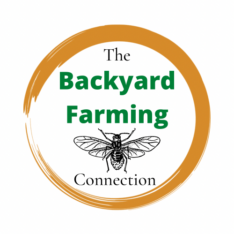Companion planting is a gardening technique that involves strategically planting certain plants next to each other. Certain plants (known as companion plants) pave properties that benefit each other – either through pest control, living mulches or nutrient accumulation. We’ve been experimenting with interplanting for many years and in this article I will share the best fennel companion plants to use in your garden.
Fennel is actually one of the plants that I find more difficult to interplant most because of it’s allelopathic properties – in general fennel is finicky! It is one of the few herbs that I prefer to grow in a container. If you still insist on growing it with other plants, you can see our tips below.
Learn more about Companion Planting and Permaculture here in the Backyard Farming Connection or hop over to get our Newsletter!
Contents
What to Know about Fennel
Before we look at some specific suggestion for fennel companion planting, it helps to know a bit about fennel.
First – there are different types of fennel. Finnochio Fennel is a smaller plant and is completely edible – so in addition to the leaves, you can also eat the bulb. Common fennel on the other hand grows huge and you can’t eat the bulb. This fennel is typically grown as an herb.
Second – fennel is a heavy feeder with it’s large bulb. This often pulls nutrients from the surrounding area and makes it a less enjoyable plant for many other companions. Common fennel also gets so massive it creates a lot of shade.
Fennel is also considered an allelopathic plant – meaning it releases compounds that can inhibit the growth of nearby plants. Fennel produces allelopathic compounds, primarily in its roots, that can affect neighboring plants through various mechanisms.
One of the main allelopathic compounds found in fennel is anethole, which is responsible for its distinctive aroma and flavor. Anethole has been shown to have negative growing effects on surrounding plants by inhibiting seed germination, root growth, and overall plant growth. When fennel releases anethole into the soil through its roots, it can create a zone of inhibition around the plant, where the growth of other plants is suppressed. This means it can be unhelpful to grow as a companion plant for most plants, but if plants can tolerate this compound, fennel can help reduce weed pressure.

Best Fennel Companion Plants
If you decide you want to companion plant fennel, there are a few plants to co-exist well.
Benefits of Planting fennel with companions:
- Fennels flowers can attract beneficial insects like ladybugs, bees, and hoverflies. This helps in two ways – one to control unwanted pests and the other is to air in pollination of other plants.
- There is also some evidence the the strong scent of fennel can help deter unwanted pests.
- The tall nature can act as natural shade for some plants during the hot summer months.
- The allelopathic properties mean that other things simply won’t grow nearby so plants that can benefit will see reduced weed pressure.
Anise
Anise is a good companion with fennel as both plants belong to the Apiaceae family, sharing similar growth habits and providing a harmonious visual and aromatic appeal in the garden.
Marigolds
Marigolds are beneficial companions for fennel as their strong scent can deter pests such as nematodes and aphids, while also attracting pollinators and beneficial insects. Marigolds are a companion planting powerhouse!
Nasturtium
Nasturtiums make good companions for fennel because their trailing nature helps suppress weeds, they attract predatory insects to control pests, and their vibrant flowers add color to the garden. We interplant nasturtium around our garden for these benefits.
Dill
Dill is a beneficial companion to fennel as it attracts beneficial insects like ladybugs and lacewings while also acting as a trap crop for aphids, thus aiding in pest management.
Coriander
Coriander, also known as cilantro, complements fennel by attracting hoverflies and parasitic wasps, which help control aphids and other pests, while also providing culinary benefits.

Plants to Avoid with Fennel
While some of the plants above will tolerate and potentially help around fennel, but most plants do not like fennel! My best piece of advice is to grow fennel by itself! The of course is hard to do. In general the biggest plants to avoid are:
Tomatoes and Nightshades
Fennel has been observed to have an adverse effect on the growth and health of tomatoes and other nightshade plants so avoid planting them near.
Beans and Peas
These legumes do not fare well near fennel due to its allelopathic nature. I usually keep a few rows between beans and peas and my fennel.
Other Bulbous Plants
Avoid planting other bulbous plants near fennel, such as onions or garlic, as they may compete for space and resources and may not thrive well together.
Carrots
Fennel and carrots are both members of the Apiaceae family and may compete for similar nutrients, so planting them together could lead to reduced growth for both plants.

Want to Learn more about Companion Planting? We’re hard at work writing up guides based on our own experience. See some of the guides below:





 Just straight up homesteading ideas sent directly to you.
Just straight up homesteading ideas sent directly to you.